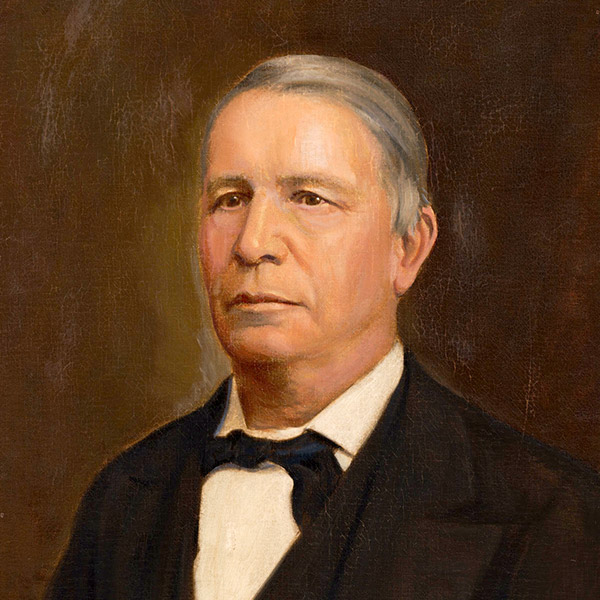William Carey Crane
Baylor President, 1864-1885

As the end of Baines' second year approached, the trustees finally were successful in identifying an individual who seemed capable of bringing Baylor back to its original "glory" and of moving it forward to greater heights. He was William Carey Crane, a native of Richmond, Virginia whose residence at that time was in New Orleans and who currently was in Texas to consider becoming the pastor of the Baptist church in Houston.
Crane was convinced by some of the Baylor trustees to visit Independence to look over the situation there. The trustees then offered Crane the presidency at a salary of $3,000 per year, plus all the corn and meat he would need. He accepted with the provision was that his responsibilities not begin until the following January. (Of the promised salary for the first year, he received only $45 along with most of the corn and part of the meat. The trustees did, however, lend him three wagons for the transportation of his family and household goods from Louisiana.)
An alumnus of some of the best schools in Virginia, Maryland, and New York, William Carey Crane was the best educated person to hold the reigns of Baylor during its entire existence at Independence. Some called him the "best-equipped college president of his day in Texas." He had been a teacher and preacher in Georgia and Alabama and had performed the marriage ceremony of William Tryon and Louisa Higgins shortly before they departed for Texas in late 1840, and he had probably been acquainted with R. E. B. Baylor who had lived in Alabama for more than two decades before coming to Texas in December 1839.
One of the first things Crane did as president was to reclaim some of the buildings from the Confederate soldiers who had been living in them. For the most part the structures were "floorless, windowless and roofless." The soldiers had burned everything that would ignite for cooking and to keep warm. Next he turned his attention to increasing the size of the student body. In this endeavor Crane was fairly successful, due in part to his practice of bartered goods and services to pay for tuition and fees.
For the next five years Crane operated the school on the edge of bankruptcy, and in January 1869, he actually saved it from oblivion by raising approximately $300, including $100 which he had inherited, to purchase the campus back from an individual who had just bought it at a sheriff's auction to satisfy a ten-year-old $200 debt for shingles.
Crane was a prolific writer and carried on a voluminous correspondence with people across Texas and the United States. He managed a full load of pastoral and administrative responsibilities, including teaching eight hours a day five days and did yeoman's duty as business manager and public relations director. In addition, he personally repaired fences and buildings, planted crops, killed hogs, kept books, built fires, counseled students and parents, solicited funds, attended conventions, lectured on a variety of subjects, wrote numerous articles and several books, and pastored a full-time church. His speaking schedule was arduous and included a variety of audiences such as Masons, churches, government bodies, teacher organizations and temperance groups.
As was the case with the three men credited as founders of Baylor University and the majority of the first Board of Trustees, Crane was a slaveholder. In 1850, when he was living in Yazoo, Mississippi, and serving as a Baptist minister, he owned two enslaved women. While serving as Baylor’s president, Crane asserted “the true doctrine” of slavery as being a trust “divinely committed to the people of the Confederate States” that they had “no right to abandon or to surrender.”
Besides being highly knowledgeable about education and religion, Crane could speak eloquently on such subjects as mineralogy, hygiene, hydrostatics, mental health, Hebrew poetry, nationalism and super-naturalism. He devoured books and his personal library contained upwards of 5,000 volumes. Shortly before his death in 1885 records indicate that during his twenty-one years in Texas he had preached 2,064 sermons, given 100 lectures, baptized 309 converts, married 89 couples, conducted 78 funerals, helped ordain 13 ministers and 14 deacons, and raised about $23,000 for Baylor--all this in addition to his heavy administrative, teaching responsibilities and arduous labors as a campus "handy man."
During his two decades at the helm of Baylor in Independence, Crane made a valiant but futile attempt to develop a strong, permanent university. According to one Texas Baptist historian, "The tragedy of the situation lay in the fact that Crane was wasting the ripest years of his noble career on a situation which was predestined to failure. He made an heroic struggle and spent much of his own wealth (estimates range from $7,000 to $10,000) all because neither he, nor the leaders of the denomination, nor yet the people of Independence, could rightly interpret the handwriting on the walls."
Much of his time at Baylor was spent in confrontations with Rufus Burleson who, because he wanted his Waco University to be the primary Baptist university in Texas, fought with Crane for the public eye and the Baptist dollar. (It was the constant competition between the Independence and Waco universities that eventually led to the unification of almost all Texas Baptist organizations and the formation of the Baptist General Convention of Texas in 1886.)
